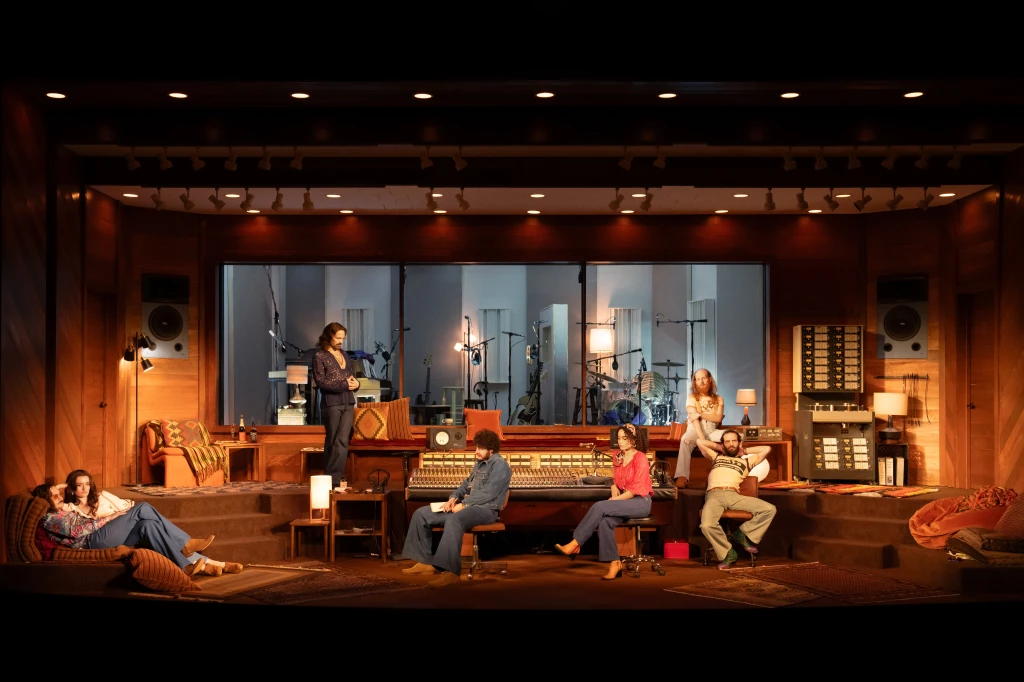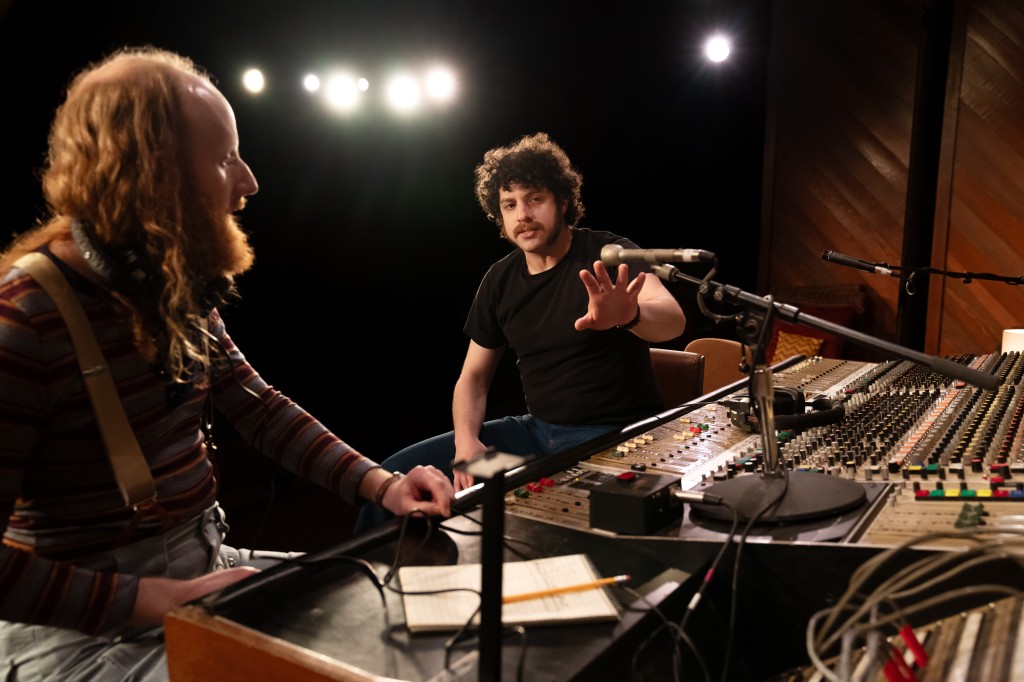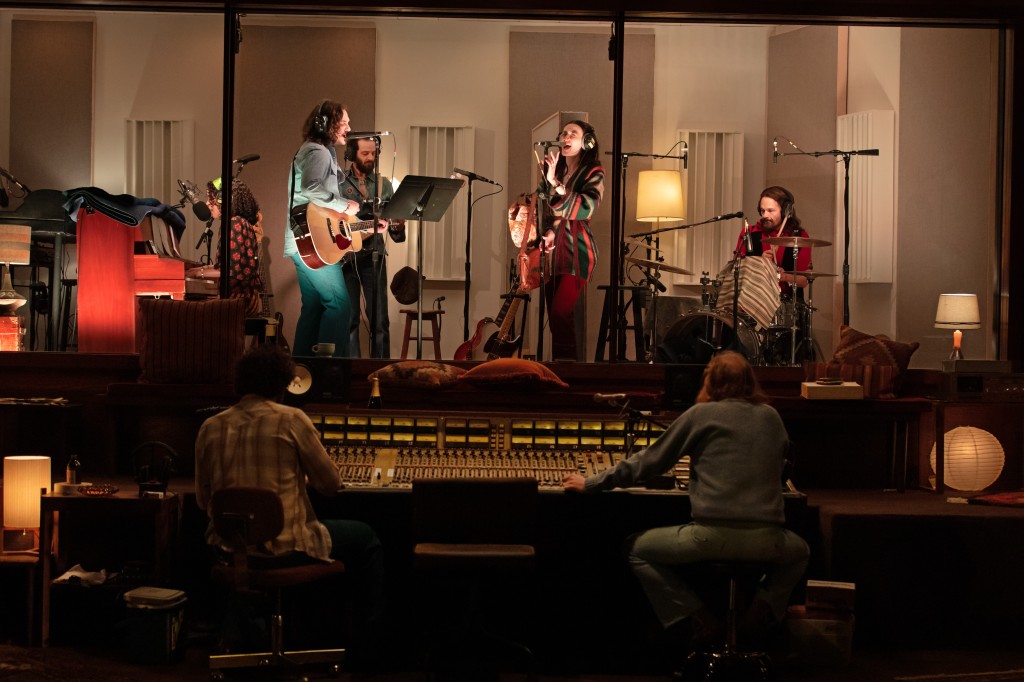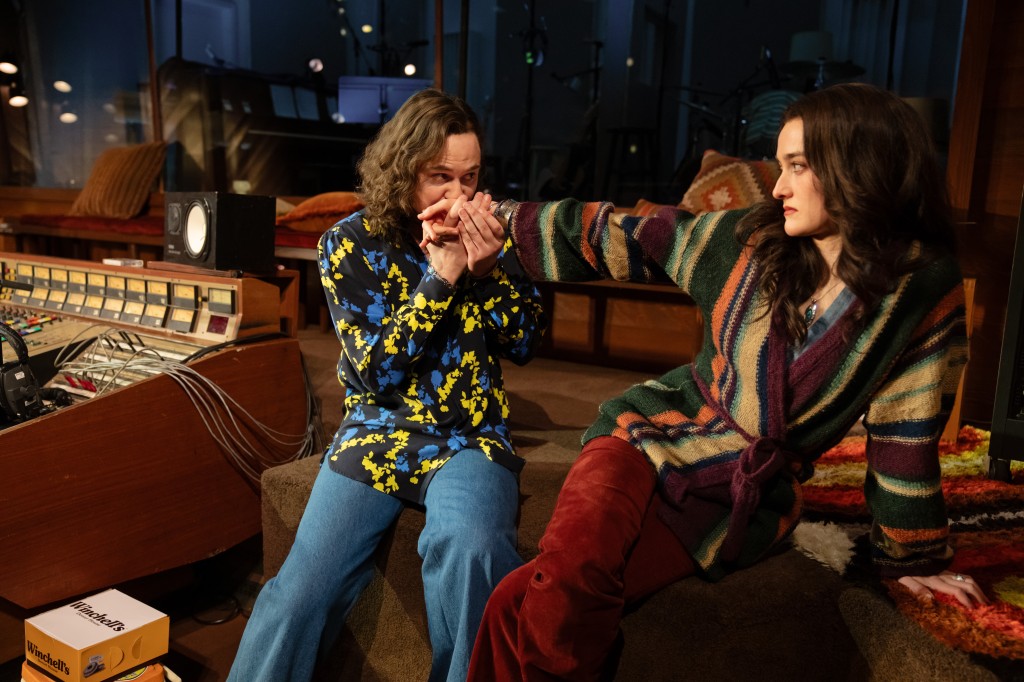Blog Archives
‘Stereophonic,’ Adjmi’s Hit Transfers to Broadway

When Stereophonic opened at Playwright’s Horizons in the fall of 2023, the hybrid comedy/drama/musical was extended a number of times for a multitude of reasons. The acting was superb. The subject matter intrigued. Who is not enthralled by a smooth rock band on the cusp of greatness with a chonky financial contract, “getting their s%$t together,” as a small privileged audience watches them record their artistry in two sound studios? Under pressure, the two couple’s relationships straining, the husband-wife partners display pustules bursting with emotionalism, and the audience sees the interior of these relationships. What’s not to love?
This is live theater at its best. The audience lives moment to moment with the musicians (we have forgotten they are actors), riding to the mountain tops and canyons as we joy to their pain of creation, producing what may be a #1 album that soars to the top of the charts. In its transfer and Broadway premiere at the Golden Theatre, the cast, music, verité style, and arc of development are the same as is the three-hour length as in the original production at Primary Stages. Bravo. It is still a must-see.

Why would playwright David Adjmi (The Evildoers, Stunning), Will Butler, who wrote the terrific original music and lyrics, and superb director Daniel Aukin muck with success? The solid, winning substance of Stereophonic is about the five-member rock band and studio engineers working at an accelerated pace to record an album at two California sound studios in the mid-1970s. We get the “low-down” perspective of what it takes to be great.
Above all Stereophonic Broadway remains a stylistic masterpiece of theater verité with a view into two separate worlds, music creation and technical engineering, without which musicianship would not exist. The meld of the two in a great album reveals the dynamic genius of technicians and musicians, though the musicians are the public face who receive all the glory.

Two points to make about the production, which is integrated and fantastic from my perspective, with one suggestion. First, Stereophonic may not be understood by a “Broadway” type audience, who might not have the patience to work through the incredible detail of “moment to moment” dialogue and complications so organically constructed, intimate and authentic, that the realistic action brings one into oneself, rather than encouraging escapism in a flight of song and dance numbers characteristic of “the Broadway show.” In its brilliance, Stereophonic may not be fully appreciated for what it is. Stereophonic is a “one-of-a-kind” original that provides an electrifying evening of music creation as one would imagine happened in iconic recording studios like Muscle Shoals Sound Studio in Alabama or Abbey Road in London, perhaps, without the histrionics.
Secondly, in its staging at the Golden Theatre, a larger venue, the sound design has to be properly figured out by the designers, and the actors. They are not in a smaller venue. The actors must project, especially when their backs are turned from the audience. The sound design must be at equal level in every portion of the theater to eliminate dead spots. In the transitioning this must continue to be fine tuned.

For rock fans and those fascinated by the ethereal nature of how bands collaborate, the Broadway production mesmerizes because we clearly understand the division between the musicians’ mystical artistry, which is always front and center, and the unseen, faceless, backstage engineering by Grover (Eli Gelb), and Charlie (Andrew R. Butler), who are finally revealed in process. It is the engineers’ artful techniques which enhance the overall effect and impact of each recorded song. This division of the two different realms of making music is beautifully manifested in David Zinn’s wood paneled scenic design, and Jiyoun Chang’s lighting design, which Aukin carried over to Broadway, along with Enver Chakartash’s period costume design. Robert Pickens & Katie Gell’s hair and wig design are new in this production.
As at Primary Stages, the Golden Theatre’s stage is divided into two sections. The upper level reveals the sound studio protected by glass, where we see and hear the musicians perform in a theater verité style, as they stop to revise tempos, add pauses, evolve riffs, etc. Downstage is the massive control panel where the engineers sit mostly with their backs to the audience and work to serve, manipulate, and stoke the musicians’ extraordinary talent and heightened emotional states, all the while discussing “their truth” with each other. With Aukin’s superior staging, we can track both worlds, feeling we are in their midst, interactively participating in music creation and understanding how the worlds precariously interact.

Though band members treat Grover and especially the shy Charlie as invisibles they don’t speak to, without their efforts the band’s unique identity and glorious sound wouldn’t exist. Therefore, in the production’s arc of development, Adjmi gradually uncovers the engineers’ centrality to the creative process and the band’s success. It is especially funny and poignant to witness how the engineers moderate the emotional infantilism of the “high-strung” musicians to get the recordings in top shape.
Throughout, drugs and alcohol become a panacea to quell the rough edges of sleep deprivation and stimulate a frenzied work environment. The cocaine, supplied by overworked engineers, keeps the band working at a frenetic pace. Ironically, drug use intensifies the arguments but floods the band’s creative juices.

Aukin’s vision of Adjmi’s themes of art, music, sacrifice and suffering, heighten the importance of sound engineers. They must have skill and expertise in the control room, as well as the personalities to cope with and manipulate artistic personas like druggy Reg (the hysterical and funny Will Brill), and diva Diana (Sarah Pidgeon).
For example Grover and Charlie must be temperate as Diana strains to get the notes, emotionally loses it, and must be encouraged by her partner lead musician and producer Peter (Tom Pecinka), to try again and again to “get it right.” Additionally, the engineers must be purposed to withstand the emotional word bludgeons from their “boss,” Peter, who launches off into a demeaning tirade against Grover and fires him. It is an idiotic move because Grover is the backbone of the album and Peter knows it. That is why he later makes Grover co-producer and apologizes.
The songs of Will Butler, (Oscar-nominated and former member of the Grammy-winning indie rock band Arcade Fire), remain as striking as ever. Indeed, one would wish that this band does produce an album, finishing the partial songs (we only hear a few in their entirety), that we hear them rehearse. The songs resonate with the themes of emotional yearning and the deceptions of fame, money and commercialism, the masquerade that they must avoid. If they embrace the commercialism, they will lose their way as artists, attempting to achieve perfection, a goal of the hard driving Peter.

Butler’s songs importantly reveal the raw emotions of anger and hurt, stirred by betrayal and loss that couples Reg (Will Brill) and Holly (Juliana Canfield), and Peter and Diana, experience in their relationships. Working frenetically together in close quarters to exceed the results of their previous album require sacrifice to be great. Peter constantly pushes them toward this. But by the conclusion as their work is finished, all have suffered for it. Simon (Chris Stack), who has been away from his wife and children for six months faces the threat of divorce and losing his family.
However, only Diana has been signed on to be a solo artist. Is the pain, suffering and sacrifice worth it for the others? Juliana Canfield’s Holly, a close friend and ally of Diana, congratulates her on this success. But we are left wondering if they will remain close or if the band will remain together to collaborate again?
A tour de force, Stereophonic runs over three hours with one intermission. Thanks to Adjmi, director Daniel Aukin, the sensational cast, whose acting chops and vocal talents are non-pareil, and the technical design team, the compelling forward momentum of the band’s creative dynamic resonates with powerful immediacy.
Special kudos goes to Music Director Justin Craig and Will Butler and Justin Craig’s orchestrations.
Stereophonic runs through July 7 at the Golden Theatre (252 West 45th Street, between Broadway and Eighth Avenue). www.stereophonicplay.com
‘Sunday’ by Jack Thorne, Directed and Choreographed by Lee Sunday Evans

(L to R): Christian Strange, Sadie Scott, Ruby Frankel, Zane Pais, Juliana Canfield in ‘Sunday,’ written by Jack Thorne, directed by Sunday Lee Evans (Monique Carboni)
Sunday by Jack Thorne, directed and choreographed by Lee Sunday Evans is a striking look at youth in its misery and glory. Thorne, best known for his success with Harry Potter and the Cursed Child, doesn’t take the easy road in this play which melds narrative, action and dance sequences to reflect all that we need to know to understand Thorne’s characters and the events that happen one Sunday evening to impact their lives. The dance sequences representative of the energy and vitality of the characters provide a much needed contrast throughout thanks to Lee Sunday Evans (Dance Nation-Obie, Lortel awards) who also directed.

Maurice Jones, Sadie Scott in ‘Sunday,’ written by Jack Thorne, directed by Sunday Lee Evans (Monique Carboni)
The active narrative by Alice (Ruby Frankel) summarizes a catch up history of the characters in the opening scene and particularly focuses on protagonist Marie (Sadie Scott shines in the second half of the play) an outlier and self-conscious, introvert. Alice comments on choice tidbits during the extended evening of drinking, talking books and sniping sub rosa insults, prefacing her commentary to shore up the audience’s attention about a character’s particular “defining moment.” She concludes her narrative with an epilogue reviewing how each character “turned out” decades later as a fascinating exclamation point.

Christian Strange, Juliana Canfield, Ruby Frankel, Sadie Scott, Zane Pais in ‘Sunday,’ written by Jack Thorne, directed by Sunday Lee Evans (Monique Carboni)
As we reflect on their interactions in present time, we have a superficial glimpse into how they may have evolved to their final result in the future. But this is in retrospect; hindsight is an exact science. We learn what they “have become” at the play’s conclusion.
The only character who has substance so we may empathize with her is Marie. But between the past and the future which Alice relates is the shadow of present time, a Sunday evening party among “friends.” As we watch the “major” event unfold, Thorne relates an important theme of the play. Human beings rarely live in the present moment to understand how that moment has a particularity all its own. Nor do they understand how it leads to the next and next in the series of the rest of the moments of their lives. Only when there is acute pain and a shattering soul earthquake do they turn on an axis to remember the jump off point into another development in their life’s journey.

Maurice Jones, Sadie Scott in ‘Sunday,’ written by Jack Thorne, directed by Lee Sunday Evans (Monique Carboni)
On this particular Sunday evening, Marie experiences an event and responds to create a sea change in her life which she propels in one direction, a return to home for solace and comfort. Thorne shows us the how and why of it. Meanwhile, the other characters, especially Bill are the backdrop against which Marie batters herself into an awakening to change the direction of her life.

(R to L): Juliana Canfield, Christian Strange, Sadie Scott in ‘Sunday,’ by Jack Thorne, directed by Lee Sunday Evans (Monique Carboni)
Evans has staged Alice above the fray to comment on the action and characters as she sits with a lone spotlight in the dark on piles of books, then comes down to join the others for the party. The books are a quasi dividing wall in Marie’s and Jill’s apartment n New York City where they live and work and have their book sessions. Perhaps the book wall is an intellectual symbol to keep others out. It is an intriguing set piece. On this evening right before they gather, Bill (the excellent, Maurice Jones whose vibrance carries the second part of the play) the neighbor stops by and tells Marie he can’t join her for the party since he works the next day. He also asks Marie if she can keep the music down.

(L to R): Ruby Frankel, Juliana Canfield, Zane Pais, Sadie Scott, ‘Sunday’, directed by Lee Sunday Evans, written by Jack Thorne (Monique Carboni)
From the time the others join in and have their discussions about the book of the evening and more, we learn salient pieces of information about each of them. The conversation is not earth shattering, the wisdom is not in abundance and the self-indulgence is obvious. Jill and Milo are an item and express their affection. Marie doesn’t appear comfortable. As she recently lost her job because she doesn’t “fit in,” it seems that she now carries this mantle into the party. Though her strong friendship with Jill (Juliana Canfield) is a boon, Milo (Zane Pais) appears to be jealous and resentful, especially toward the end of the evening as he insults Marie. Keith (Christian Strange) rounds out the group of drinkers adding his opinions.

(L to R): Christian Strange, Sadie Scott, Ruby Frankel, Zane Pais in ‘Sunday,’ directed by Lee Sunday Evans, written by Jack Thorne (Monique Carboni)
The most pleasant session of the first segment of the production is the dance sequence. A few times the group break into a dance to express their inner emotions, yearning to escape from their lives of boredom and sameness. The actors have convinced us outright of the stasis and purposelessness of their lives. Thus, the dances are a breath of fresh air. Indeed, more could be added to break up the monotony of talking heads who slide past each other without really looking for the uniqueness or resonance of each other’s humanity.

(L to R): Sadie Scott, Zane Pais, Ruby Frankel, Juliana Canfield, ‘Sunday’, Jack Thorne, Lee Sunday Evans (Monique Carboni)
As the evening comes to a close and the others leave, Marie falls apart and weeps for her miserable self. Her self-recriminations spiral her into an emotional refuse pile of self-loathing. For solace she calls Jill to come back and spend the night with her away from Milo. When the knock comes at the door, we are relieved to see it is the interesting Bill who makes his way into her apartment stating he couldn’t sleep.
The scene between them evolves with humor (Maurice Jones’ timing is spot-on). And there is a sensual tension that holds promise stoked by Marie who is desperate to make human contact so that she won’t feel so alone. Ironically, it is she who is the one who pushes the sex on Bill. And it is he who avers and attempts to slow the situation down to get to know her better. A writer, he eventually shares his novel’s plot. Indeed, he is one with whom she could, if she is ready, establish a lasting, sensitive relationship with. Thorne gives us this clue when Bill responds to her question what is it that he likes about her. Bill’s answers are poetic, profound, lovely. However, Marie in loss and confusion pushes the sex, demeaning Bill’s ethos and being. Clearly, her devastation and emptiness cannot recognize who Bill is and the soul clarity he can offer her.

Sadie Scott, Juliana Canfield, ‘Sunday,’ written by Jack Thorne, directed by Lee Sunday Evans (Monique Carboni)
The ending and the epilogue follow fast and we are disappointed. We understand that the human factor takes over. Marie fails to seize the opportunity for love that stands in front of her. Allowing the morass of self-loathing to overwhelm her, she chooses a path of retreat. In the epilogue that April matter-of-factly delivers, we discover how she lives the rest of her life from then on, materially. Whether her soul spark resurrects, April does not delineate. The sense of loss of human creativity and opportunity for something marvelous in the lives of these characters, regardless of their bank accounts, overwhelms.

(L to R): Zane Pais, Christian Strange, Ruby Frankel, ‘Sunday’, directed by Sunday Lee Evans, written by Jack Thorne (Monique Carboni)
Thorne’s play is about so much more than youth grappling with identity in a chaotic world. It is about the soul and the spirit missing the tremendous chances offered which are not taken up or recognized. Fear and self-restriction in the protagonist Marie as everywoman looms in everyone’s lives. To break beyond self-loathing, purposelessness, misery and disappointment takes courage and persistence. It is easy to return to a place of comfort which neither challenges nor stimulates us to be different. Thorne’s themes resonate not only for this age group, but for every stage every age group. Boredom is not an option, nor is self-loathing as long as there is life. As Thorne suggests, we define the moments in our lives when we control the narrative. It is when we allow others to define who and what we are that we become lost.

The ensemble of ‘Sunday,’ written by Jack Thorne, directed by Lee Sunday Evans (Monique Carboni)
The play is slow moving in the beginning to exact Thorne’s themes and for the dance scenes to represent the great contrast in the inner souls of the characters who find dance their purpose and form of expression. Also, the contrast between the younger characters’ callowness and Bill’s wisdom, likeability, sensitivity and grace (so beautifully rendered by Maurie Jones) pops because the ensemble is by nature invisible emotionally with the exception of Marie. The scene between Jones’ Bill and Scott’s Marie is smashing and worth a look see for the acting, writing and direction.
Sunday features scenic design by Brett J. Banakis, costume design by Ntokozo Fuzunina Kunene, lighting design by Masha Tsimring, sound design by Lee Kinney, original compositions by Daniel Kluger
Sunday runs with no intermission at Atlantic Theatre Company (West 20th Street between 8th and 9th) until 13th October. See it before it closes. For tickets and times CLICK HERE.